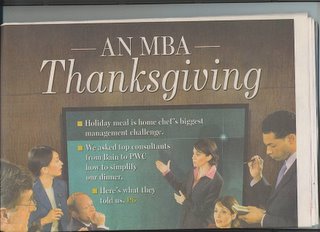Hey Wall Street Journal - Stay Out of the Kitchen!
 I hate it when business publications take it upon themselves to diagnose issues of culture, politics, religion, art, etc., from a business viewpoint. In my opinion, this is a case of sticking your nose in where it doesn't belong.
I hate it when business publications take it upon themselves to diagnose issues of culture, politics, religion, art, etc., from a business viewpoint. In my opinion, this is a case of sticking your nose in where it doesn't belong.Last weekend I accidentally received a copy of the Weekend edition of the WSJ. The cover story of its "Pursuits" section was entitled, "An MBA Thanksgiving". I thought it was surely a spoof, but upon reading through the article it was hard to tell. The piece contained too much tongue and not enough cheek. It's satire was tepid and the focus on practical advice was more serious than humorous. It left me to conclude that at an MBA Thanksgiving, turkeys get to design the dinner not just star on the menu.
Reading through the absolute nonsense presented in this article was enough to put me off even the best of Holiday dinners. Everything about it made my blood boil. The fact that preparing holiday dinners is seen as a 'problem' rather than a pleasurable event. That preparing food is a chore to be made as easy and efficient as possible rather than an act of joy, love and family bonding. That preparing and cooking a feast is a 'process' that needs to be 'reengineered' rather than a ritual that should be protected and cherished at all costs!
This kind of domineering projection of the business/corporate ethos on everything and anything really puts me off. It so happens that I have an MBA, but I am also an avid home chef and food and wine enthusiast. If you've read any of my other blog entries you will know that I do not look kindly on the process management/reengineering zealots that prowl the corporate environment. While these concepts have their place in business, they often do more damage than good in my view. And they certainly have NO place in the home kitchen, especially applied to the one day of the year that the majority of Americans make food and dining together the focal point of their lives.
The WSJ decided to call in the killjoys from five consulting firms, Bain and Company, PricewaterhouseCoopers, The Boswell Group, Katzenbach Partners and The Monitor Group. Their analysis and suggestions vascillate between the mundane and uncreative to the outrageous and ridiculous.
Bain & Company talks about a California-based fast food chain In-N-Out Burger as a model of best practices that the Thanksgiving chef should adopt. Right... In-N-Out - does this refer to the speed at which one can purchase food there or the digestive effects of eating it?
PricewaterhouseCoopers provides some half thoughtful although largely impractical advice centered around not inviting "family members known as troublemakers simply out of guilt or obligation". Nice idea but how many people are prepared to endure 364 days of yearly aggravation as a result of omitting overbearing, pain-in-the-butt relatives from the guest list one day a year?
The Boswell Group (not sure where they dug these guys up), a firm that specializes in applying psychoanalysis to businesses and their leaders recommends that Mom's need to be more controlling at Thanksgiving dinner. "When you have a clear task at hand - in this case getting a meal on the table - creativity is really counterproductive". The implication is that Mom should simply dictate the menu and make no pretense of trying to placate or satisfy warring relatives. I can hear the legions of people with a controlling matriarch at the top of the family hierarchy saying, 'HELLO - welcome to the real world.....".
Katzenbach Partners jumps in with both feet, advising an 'employee empowerment' stratgy and 'pride-building'. "Give your helpers a chance to exercise their judgement and truly run their own tasks." They recommend taking a page out of Southwest Airline's book by giving crews "a great deal of latitude to create a quirky, fun experience for customers". Are you kidding me - taking advice from an AIRLINE about how to prepare a quality meal? Heck, Southwest doesn't even serve food!
Michael Porter's Monitor Group weighs in last. It recommends segmenting the market to see what different groups of guests want and creating products (in this case dishes) that please each of your audience groups. Then, find out what each segment wants and make sure there is something for every segment at the dinner. This bit of advice contradicts the 'complexity reduction' theme of the article. But Michael Kinst of Monitor, to whom the article refers as a "foodie who thinks cooking might be a good second career", offers a useful tip for the culinary clueless - buy turkey wings and thighs and use them to make your gravy on Wednesday night. He claims this will save the cook from a distracting and time-consuming task that "can make all the difference in your product perception". My advice to Michael - stay in management consulting.
The article concludes wih three 'reduced-complexity recipes' for dishes named 'rapid-results sweet potato soup', 'overall-equipment efficiency onions and peas' and 'guest-sourced sausage and apricot stuffing'. Too-bad they didn't include any remedies for buzz-word induced indigestion.
